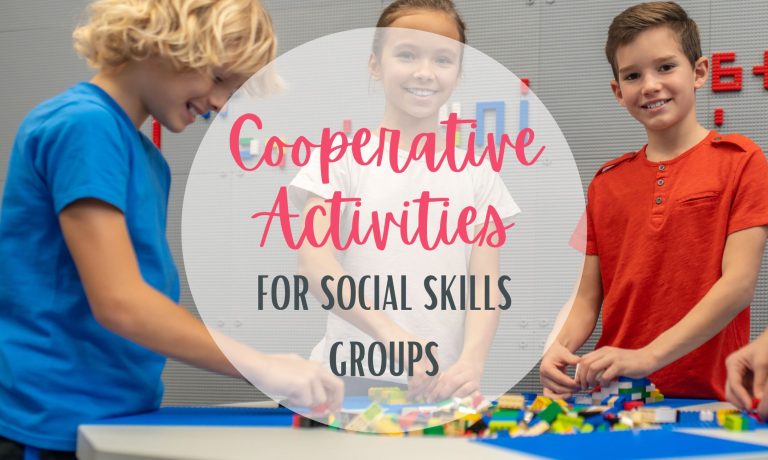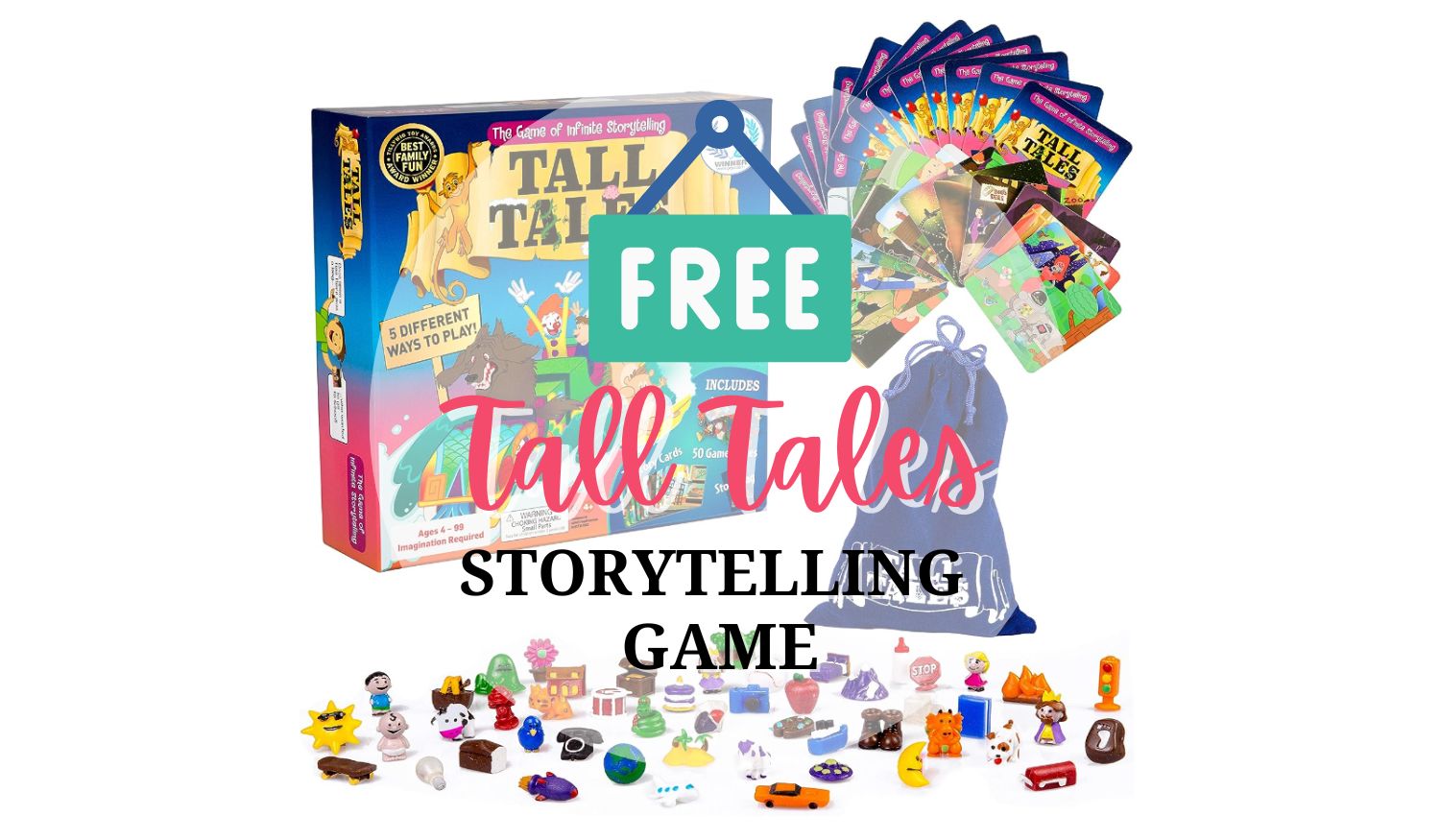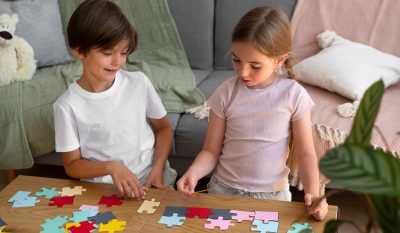
Cooperative Learning Activities
More than ever before, many of our speech and language students need to practice their pragmatic language skills (social language skills). Social skills groups offer an opportunity to practice these skills with peers in a safe and supportive environment with adult support. Skills practiced in these groups might include conversation skills, play skills, understanding/expressing emotions, nonverbal communication, perspective taking, and understanding social rules/expectations. Many of these skills can be targeted through cooperative learning activities. Cooperative activities promote teamwork, communication, and problem-solving skills. They also help students build social connections and develop a sense of community. This blog post summarizes some of my favorite cooperative activities to help students improve their social skills.
As an Amazon Associate, I earn from qualifying purchases linked in this post.
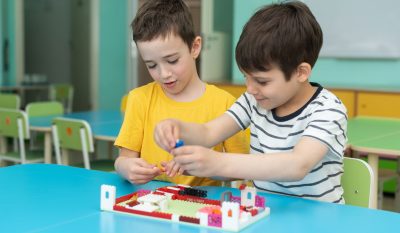
Cooperative Construction
When kids build things together, they are learning to communicate, collaborate, negotiate, and coordinate their efforts. Constructive activities like blocks, legos, marble runs, and magnetic tiles offer a non threatening way to practice social skills. Students can play alongside each other sharing materials until they are ready to work together on a cooperative project. I have also found that many of my students are more talkative when we are engaged in constructive play. Their hands are busy and there is less pressure to sit still, make eye contact, etc.
Puzzles are also a natural way to practice working together to accomplish a common goal. Students can work together on the same puzzle or have smaller puzzles side by side. I have even purposely given students some of each other’s puzzle pieces so they can practice requesting items from each other. Tangram puzzles are also a fun option for students. You can give them cards with set pictures to create or let them use the blocks to create their own designs together.
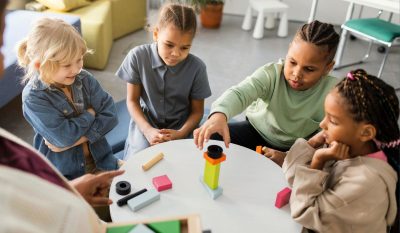
Cooperative Games
Games are one of the most common tools for practicing social skills. Games teach children many important social skills such as sharing, taking turns, following the rules, and good sportsmanship. But let’s face it, kids don’t like to lose. In general, I tend to downplay the winning aspect of games during our social skills groups. For the most part, we don’t worry about points or “winners” when we play games. The goals are COMMUNICATION, COOPERATION, and FUN. I have noticed a trend in recent years that more and more people are playing cooperative games. In a cooperative game, players work together as a team. Cooperative games are based on cooperation rather than competition. These games create a more supportive playing environment (rather than competitive) and promote teamwork. This can reduce the stress level for children who have high anxiety or struggle with losing.
Charades is a classic game that can be a fun and engaging way to promote communication skills. One child acts out a word or phrase without speaking, and the other children try to guess what they are acting out. This activity helps children practice nonverbal communication and interpreting gestures and facial expressions. If you are looking for a charades game with visual support, you might be interested in this Picture Charades activity.
There are many commercially available cooperative games and here are some of my favorites:
- Dinosaur Escape Cooperative Memory Game
- Mermaid Island
- Hoot Owl Hoot
- Feed the Woozle
- Snug as a Bug in a Rug
- Happy Bunny
Speech language pathologists are notorious for changing the rules of games and I am no exception. As a result, I frequently modify or adapt games to make them more cooperative. Here are some examples:
Memory – Students work together to find all the matches
Let’s Go Fishing – Students work together to catch all the fish.
Jenga – How tall can you make the tower together?
Suspend or Chairs – How many pieces can we balance as a team?
Topple – Can the group balance 20 pieces? 30 pieces?
Candyland – Students can move any game piece and the goal is to get everyone to the candy castle. Sometimes I also stack the deck by removing the cards that make you go backwards.
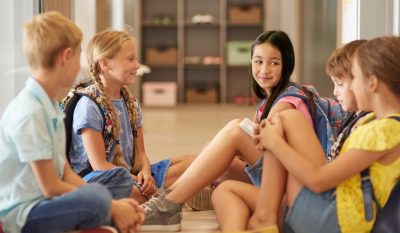
Cooperative Conversations
When you think about it, conversations are also a cooperative activity. During conversations, students take turns, comment, ask questions, and build on what the other person is saying. Ice breakers (Conversation Starters) offer students a chance to practice these skills during a short conversation. See my blog post on Conversation Starters for more information. Would you Rather (This or That?) is a popular icebreaker that is fun for all ages. Sometimes I will include visual prompts (pictures or words) to help students remember the topic of conversation. You can also visually show the length of conversations by lining up paper clips or blocks each time someone adds to the conversation.
I also have three digital cooperative conversation activities in the Pinwheel Speech store that I have created especially for social language groups. During these activities, students will work cooperatively to see how long they can keep the conversation going:
Topic Train – Students add a train car each time they add to the conversation. Be careful not to get “off track” with off topic comments or questions!
Conversation Chain – Students add a chain link each time they add to the conversation by asking a question, answering a question, or making a comment.
On Thin Ice – Students add a piece of ice to the water each time they add to the conversation.
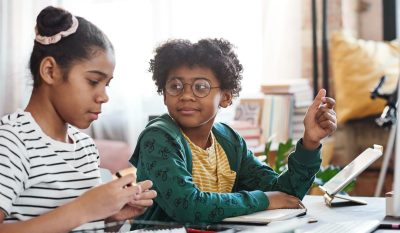
Cooperative Problem Solving
Engaging in cooperative project can be an excellent way to promote teamwork and communication. Children can practice giving and receiving directions, sharing ideas, and working towards a common goal. Many of you are probably familiar with STEM challenges and Lego challenges. These are cooperative problem solving tasks where students work together cooperatively to come up with a solution. You can introduce mini problems to your social skills groups to teach them how to work together towards a common goal. First, you will need to have some simple materials on hand like legos, straws, toothpicks, tape, popsicle sticks, playdough/clay, paper cups, etc. Next, you will present a small problem (or challenge) to the group that needs to be solved.
Here are some ideas for cooperative problem solving activities:
- Build a town for your mini figures
- Build a ramp or bridge for toy cars
- Make a leprechaun trap
- Build a tall skyscraper
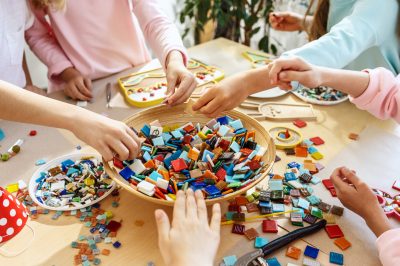
Cooperative Planning
One of my favorite cooperative activities for my social skills groups is to plan a special event together. You could plan a holiday party or an end of the year party. Students will work together to figure out the decorations, what will be needed, who will bring them, what they will do, etc. This teaches them to communicate their ideas, listen to others, negotiate, and collaborate together.
Here are some other ideas for cooperative planning activities:
- Create a game together to teach a skill to younger students
- Plan a group garden (or sensory garden)
- Plan a show or puppet show
- Create a video together to teach a skill to younger students
- Plan a work of art together (mosaic art, collage)
- Cooking or Baking
- Plan a fun event for peers (e.g., board game club, lego party)
Your Turn!
Cooperative learning activities can be such a fun aspect of social skills groups! I hope you found a new idea or two to add to your bag of tricks. Do you have any other cooperative activities that you like to use? Please comment below! I am always looking for new ideas too!
